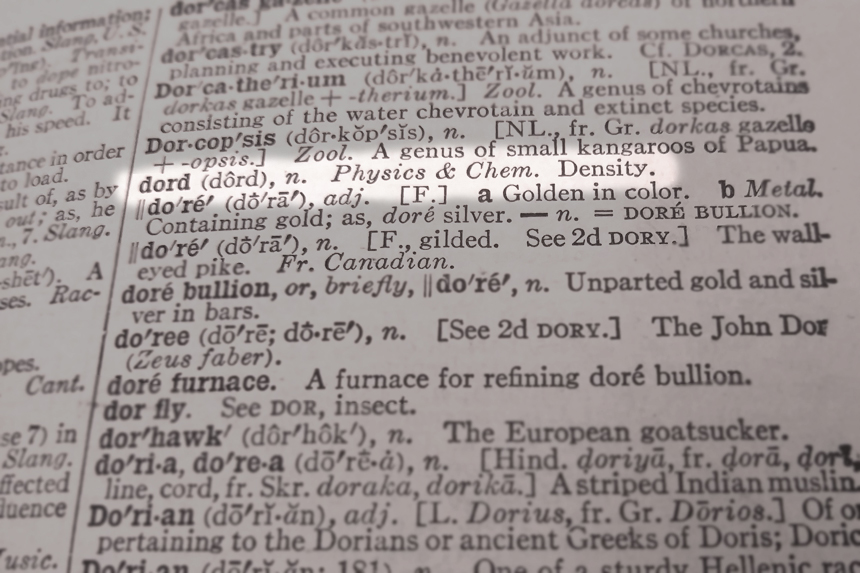In 1631, a new printing of the Bible contained an egregious mistake. At Exodus 20:14, the Sixth Commandment read, “Thou shalt commit adultery.” Roughly 1,000 of these so-called Wicked Bibles were printed before that missing not was discovered and the printing halted. For some, the existence of the Wicked Bible is a laughable reminder of our fallibility; to others, it’s a disturbing example of how even the most sacred things are not immune to humankind’s imperfections.
There are certain resources that are the secular equivalent of sacred, too. We turn to them for authoritative guidance in our personal and professional lives, rarely questioning the wisdom they hold. Psychiatrists, for example, have the DSM. Congress has the U.S. Code. And frantic, procrastinating middle school students have Wikipedia. For copy editors and proofreaders, the dictionary is such an authoritative resource — a editorial sacred text if ever there was one. Yet it, too, can be subject to human error.
Consider the entry for dord.
In the early 1930s, the editors at G. & C. Merriam Company (now Merriam-Webster, Inc.) were working hard to produce a new unabridged dictionary. One change from the previous edition that was being implemented was the transfer of abbreviation entries from the main part of the dictionary to a separate section immediately following the entries under Z.
A chemistry consultant doing work for the dictionary submitted a handwritten index card — that’s how definitions cycled through the workflow back then — dated July 31, 1931, with an entry for “D or d.” What the consultant was trying to indicate was that either an uppercase D or a lowercase d could be used as an abbreviation for density in physics and chemistry.
Somehow, this card didn’t make it into the stack destined for the new Abbreviations section, but ended up being filed with the unabbreviated words. Furthermore, those spaces around or looked different to the editors than they do to us: Space was routinely added between letters on cards like these to allow room for stress marks and syllable breaks. So to the lexicographer who examined this card, it seemed the consultant had inadvertently omitted the space between the o and the r in the entry for Dord.
So Dord (“corrected” to the lowercase dord to follow house style) made it past the definer, was given a pronunciation, somehow escaped notice of the etymologist, and went unquestioned by the proofreader. When Webster’s New International Dictionary, Second Edition (called W2 for short) was published in 1934, it contained an entry for dord — a “ghost word” that wasn’t really a word — between Dorcopsis and doré.
The error was discovered in 1939, but somehow wasn’t actually corrected in print until 1947.
When the missing not in the Wicked Bible came to light, the men who printed it — Robert Barker and Martin Lucas — were brought to court, fined heavily, and had their printing licenses revoked. King Charles I had even wanted them executed. What copies of the Wicked Bible authorities could get their hands on were incinerated, making them extremely rare today.
The makers of W2 got off easy by comparison. G. & C. Merriam Company wasn’t dragged before some tribunal, and copies of the erroneous dictionary — more than a dozen years’ worth — weren’t rounded up and burned. They aren’t rare, but to dictionary aficionados, they are collector’s items that serve as a constant reminder that nothing is beyond the reach of human error.
Featured image credit: Andy Hollandbeck
Become a Saturday Evening Post member and enjoy unlimited access. Subscribe now




Comments
It may not have existed at the time, but it sort of does now. Even a spurious word has some kind of existence, like a mythological beast, and OED chose to leave them in, enclosed within square brackets.
You first paragraph forgot to include individuals like me who don’t find anything funny about The Wicked Bible, and can ONLY venture to guess the massive amount of money one of those copies would be worth. I’d love one as much as the Wicked Witch of the West still wants the ruby slippers, and you know she does.
Andy, ‘dord’ is the dorkiest word you’ve ever featured here, seriously, and you know it! All kidding aside, I wouldn’t mind having one of the erroneous dictionaries, since I have NO chance of getting my hands on one of those bibles! The only thing I have that’s a real screwup*, is an August 1971 issue of LIFE magazine that went haywire on the printing press. Half the cover and inside pages are cut and angled wrong.
It was a copy that you guys in the magazine biz refer to as ‘damaged/spoiled during printing’ and are discarded as unusable/unsendable. It NEVER should have been sent out to the subscriber back then!! I’m glad they didn’t throw it out. It wound up at the Bookie Joint (in Reseda, Ca.) as one of the back copies of that week’s LIFE, which I bought in the early ’90s and still have in a plastic bag for oversize magazines along with a perfectly normal copy. Not sure if it has any monetary value (it should!), but has sentimental and curiosity value to me. I have something I was never meant to have, yet meant to have at the same time.
*I say it with love!